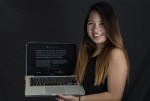Less than 15 percent of Wikipedia editors are women, according to a 2011 survey.
The lack of female editors is a problem because it leads to more inherent gender bias in Wikipedia articles, said graduate Design | Media Arts student Christina Yglesias.
An intersectional feminist collective on campus is trying to increase female perspectives on Wikipedia pages, while bringing awareness to important women in the arts sphere. VoidLab, which uses art and technology to create change, will host “Arts + Feminism Wikipedia Edit-a-thon” on Friday.
During the event, participants can edit and create Wikipedia pages to better represent important women artists. Participants can edit any page they want or choose from provided suggestions.
UCLA alum Hsinyu Lin said the Wikipedia edit-a-thon has been running globally for three years to invite all gender identities to bring unrepresented voices to an online space, and voidLab is hoping to increase the number of female Wikipedia editors in the process.
Some of the women they are hoping to write about are new media artists An Xiao Mina and Sondra Perry because both have accomplished a lot in their artistic careers – Mina helped create a platform for verifying news in realtime, and Perry had a video project solo exhibit at Seattle’s independent gallery Institution for New Connotative Action in 2015 – yet there is no information about them on Wikipedia.
Lin helped bring the event to UCLA. They were in voidLab with their friend as students, and they thought it would be a fun way to engage with feminism in the online space on UCLA’s campus, they said.
[Related: Feminist collective voidLab held poster exhibition at Broad]
“It started very spontaneously,” Lin said. “We just reached out and went to the training (for the edit-a-thon) and got organizer’s tools and just did it.”
Wikipedia does not present an equal amount of pages for men and women, Lin said. Articles on Wikipedia about women are more likely to be missing than articles about men when compared to Encyclopædia Britannica, according to a journal study.
The event does not require any experience and is open to people of all genders. Organizers of the event will provide resources such as tutorials on editing Wikipedia pages and access to an art library for information on artists, to help people learn how to edit pages, as well as information on women whose pages need to be written or revised.
Wikipedia also has subtle sexist references, like gendered language, that they want to edit out, Yglesias said.
“The art world is not very gender balanced and I’m sure the tech world is probably worse, so people are working at the intersection of those,” Yglesias said. “It’s really important to have collectives and organizations like voidLab that are talking about gender, the problems that exist and how to solve them.”
One example of subtle sexism is the way women are attached to the domestic sphere regardless of their professional lives, said Lin.
“There’s always that follow-up question, like ‘Oh, she’s so successful, but is she fulfilling her duties as a woman, as a mother?,'” Lin said. “And I think that’s a big part (of what the edit-a-thon) is trying to change.”
Lin hopes the edit-a-thon will help cut out this type of gendered language in existing pages.
VoidLab’s edit-a-thon will be informal, said Chelly Jin, a third-year Design | Media Arts student. VoidLab’s main concern is having a warm and inviting environment for everyone, Jin said.
Along with adding new articles, the collective hopes to add more information to already existing pages of important women. Yglesias is especially looking forward to creating pages for her undergraduate professors from Mills College, Samara Halperin and Catherine Wagner.
“There’s always a push to add more depth to what’s out there,” Jin said.
Female artists of the past tend to be overlooked, Yglesias said, so the edit-a-thon will help reframe the context of the past and help bring important women to the forefront, by editing not only pages of women from the past, but also by creating pages for women in the present.
“Surrounding women, a lot of our history is revisionist and it’s unfortunate,” Yglesias said. “This is one way we can have an impact, whether it’s improving pages of women artists of the past or the writing about people who are doing work right now and are really important, but are not recognized as much as they should be.”
